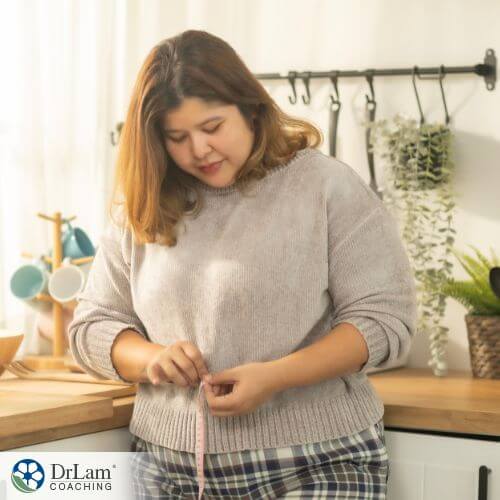 According to data presented by the World Health Organization (WHO), roughly 116 million women of childbearing age worldwide are affected by polycystic ovary syndrome (PCOS). In the U.S. alone, PCOS affects over 12% of women, with many suspected undiagnosed cases, and that figure is expected to increase with time. The way PCOS impacts women varies, but the development of a PCOS belly is a common symptom, and it’s unlike other kinds of weight gain. We explore what causes a PCOS belly and ways to address it.
According to data presented by the World Health Organization (WHO), roughly 116 million women of childbearing age worldwide are affected by polycystic ovary syndrome (PCOS). In the U.S. alone, PCOS affects over 12% of women, with many suspected undiagnosed cases, and that figure is expected to increase with time. The way PCOS impacts women varies, but the development of a PCOS belly is a common symptom, and it’s unlike other kinds of weight gain. We explore what causes a PCOS belly and ways to address it.
PCOS is an endocrine-gynecology disorder that affects many women of childbearing age and is often linked to enlarged and dysfunctional ovaries, excess androgen levels, and insulin resistance, among other factors. This hormonal disorder features small cysts located on the ovaries and high levels of androgen hormones, which regulate male characteristics.
Female hormones and the lower levels of male hormones that women have usually coexist without any trouble. However, in women who experience PCOS, the male hormones tend to be abnormally high. As such, hormonal imbalance is usually a cause of PCOS, and this can lead to issues in the ovaries that prevent the egg cells from maturing properly or releasing correctly. The latter results in the follicles the egg is in forming a cyst and abnormally low levels of progesterone. This can lead women with PCOS to have abnormal periods and develop multiple cysts on their ovaries in a year.
Furthermore, PCOS can be characterized as a metabolic disorder in which individuals often have insulin resistance or diabetes, or are overweight or obese. As a result of hormonal imbalance and inflammation, women with PCOS tend to gain weight, particularly in the lower abdomen.
Along with cysts on the ovaries, some other typical symptoms of PCOS include:
Abdominal weight gain is a symptom of PCOS, and people with this condition typically have more visceral fat (found in the belly’s deepest recesses) in the lower abdomen compared to the rest of the body. This abdominal fat is separate from your body mass index. This is called a PCOS belly.
With a PCOS belly, the shape usually differs from other kinds of weight gain people experience. Lean women or those of normal body weight can also develop a PCOS belly.
PCOS is connected to an increase in a person’s level of abdominal fat, which leads to the appearance of having a big belly. This condition causes hormonal changes that increase a woman’s risk of having excess body fat accumulate in the abdomen, rather than on other typical areas like the hips or thighs.
 A PCOS belly often presents as an enlarged belly while the rest of the body is the same size. It can look like a prominent fat pad around the middle of your waist.
A PCOS belly often presents as an enlarged belly while the rest of the body is the same size. It can look like a prominent fat pad around the middle of your waist.
However, while a PCOS belly can be bloated and large, it can also be small and round. This could depend on your genes or other factors. This kind of belly usually feels hard to the touch. Still, in some individuals, there might be no noticeable changes in the stomach.
Experts believe that the cause of PCOS belly may be multifactorial. Some believe that it’s connected to hormonal imbalance with high levels of male hormones in women, or other factors such as insulin resistance, genetics, inflammation, and metabolic abnormalities.
Additionally, experts further believe that inflammation and insulin resistance, which are also symptoms of PCOS, contribute to fatty tissue accumulation in regions around the waist. Research suggests that if you are a woman with PCOS, the fat tissue in the abdomen contains inflammatory molecules that can increase oxidative stress in your body. This may contribute to both glucose dysfunction and insulin resistance.
Several conditions are associated with PCOS belly, including:
PCOS cannot be identified from any specific test. Instead, your doctor will perform an assessment employing the use of the following:
Getting rid of a PCOS belly can be challenging, but if you do the right things, you can alleviate the symptoms and health issues linked to the condition. Here’s a look at some possible solutions.
 To manage your PCOS belly, adopt a nutrient-rich and well-balanced diet. In general, a perfect diet doesn’t exist for managing PCOS. However, to ameliorate a PCOS belly, your diet should aim to reduce insulin resistance, inflammation, and belly fat, and also promote weight loss. Research suggests that some diets are more favorable for reducing a PCOS belly. The best include the following.
To manage your PCOS belly, adopt a nutrient-rich and well-balanced diet. In general, a perfect diet doesn’t exist for managing PCOS. However, to ameliorate a PCOS belly, your diet should aim to reduce insulin resistance, inflammation, and belly fat, and also promote weight loss. Research suggests that some diets are more favorable for reducing a PCOS belly. The best include the following.
This kind of diet can help to keep insulin levels low, and in turn, minimize PCOS symptoms. According to Jerilyn Prior, M.D., insulin stimulates androgen receptors on the outside of the ovary, causing typical symptoms of polycystic ovary syndrome such as excess hair on the face, arms, or legs, thinning head hair, and acne.
Foods with a low GI digest more slowly, which causes you to avoid blood sugar fluctuations and spikes. Also, a low GI diet will help you to stay full for a longer period and can prevent overeating. This diet is one of the best ways to address PCOS. A low GI diet can include foods such as:
Furthermore, avoid high GI foods, like white rice and white bread, whole wheat bread, cakes, cookies, sweetened dairy products, breakfast cereals, potatoes, and sugary beverages like soda and sports drinks.
To address the inflammation that plays a significant role in PCOS, an anti-inflammatory diet may help to minimize a PCOS belly. Some of the foods that you can include in your anti-inflammatory diet are:
Created to aid in lowering blood pressure, the DASH diet also helps get rid of a PCOS belly. According to a study in the Annals of Nutrition and Metabolism, this diet has been shown to significantly improve insulin resistance in overweight women experiencing PCOS and also help them reduce abdominal fat.
A DASH diet is high in fruits, vegetables, and whole grains, but also includes low-fat dairy products, fish, beans, nuts, and poultry.
Also, foods that are high in refined grains, processed foods, saturated fat, sweets, and sodium are limited when on this diet.
When trying to attain or maintain a healthy weight, the calories you consume are important, and so are the calories you burn. As such, regular exercise should be a part of your lifestyle. This can help to support PCOS belly weight loss.
However, you must start with the right approach for your specific needs. This includes doing the right kinds of exercise and the right amount, as well as taking into consideration your overall weight, age, and any health issues that you are experiencing. This is especially critical for people with adrenal fatigue who experience energy depletion and adrenal crashes. It’s safest to speak to your doctor before starting a new exercise routine.
Additionally, a whole-body approach to exercise that includes both aerobic and weight/resistance training is ideal for eliminating your PCOS belly. High-intensity activities, such as HIIT; strength-training exercises, like pilates and weightlifting; gentle exercises like yoga and tai chi; team sports like tennis and hockey; and walking or hiking are all great options to include in your exercise routine.
 There is a link between insufficient sleep, insulin resistance, and hormonal imbalance. When you don’t get enough sleep, it limits how active you are during the day. Additionally, people who have not had sufficient sleep eat more calories during the day in studies. These are PCOS-associated risks, which suggests that you need roughly 7 to 8 hours of uninterrupted sleep each day to help keep risk factors for weight gain and PCOS belly at bay.
There is a link between insufficient sleep, insulin resistance, and hormonal imbalance. When you don’t get enough sleep, it limits how active you are during the day. Additionally, people who have not had sufficient sleep eat more calories during the day in studies. These are PCOS-associated risks, which suggests that you need roughly 7 to 8 hours of uninterrupted sleep each day to help keep risk factors for weight gain and PCOS belly at bay.
Simple things that you can do to improve your sleep include going to sleep and waking up at the same time each day, ensuring that your bedroom is cool, dark, and quiet, sleeping on clean bedding, and leaving your cell phone out of the bedroom to avoid distractions.
Chronic stress can lead to adrenal fatigue, which adds to hormone imbalances like PCOS. For those with Adrenal Fatigue Syndrome(AFS), the non-Addison's form of adrenal dysfunction, where the body's stress response cannot keep up with life's chronic stressors, PCOS combines in a vicious cycle.
An imbalance in the Hormone Circuit of the NeuroEndoMetabolic (NEM) Stress Response is present in both AFS and PCOS. AFS causes high, and then low levels of the stress hormone cortisol, which can lead to reproductive hormone imbalances as well. Addressing your PCOS can help to restore balance to the Hormone circuit.
Stress management is important when you have a PCOS belly since stress is a risk factor for the condition. Stress elevates your body’s cortisol levels, and this, in turn, leads to insulin resistance and weight gain. PCOS is a stress trigger, creating a vicious cycle. You can manage stress in several ways and tackle your PCOS belly in several ways, including:
Women with PCOS tend to have an imbalance of myo-inositol to D-chiro-inositol, which can cause irregular periods or stop periods altogether. Inositol is an essential nutrient that serves as the primary component of cell membranes. In a study published in the journal Frontier Endocrinology, research findings suggest that myo-inositol and D-chiro-inositol can be used to improve symptoms in PCOS patients by improving insulin sensitivity, reducing male hormones, and allowing the body to use better utilize glucose.
Dr Lam’s InoPlex comprises two types of inositol: myo-inositol and D-chiro inositol. They work together to balance hormones, stabilize and balance blood sugar levels, support weight loss, and provide natural stress relief.
PCOS can disrupt your physical and mental health, coming with an uncomfortable belly bulge and increasing your risk for a slew of other health conditions.
However, the good news is that you can do something about your PCOS belly. By adopting a healthy diet like the DASH diet or an anti-inflammatory diet, an exercise routine, getting enough sleep, taking supplements, and managing stress, you can work towards losing weight and eliminating your PCOS belly.
Do keep in mind, however, that PCOS is a complicated health issue. It may take some time, but you can get rid of PCOS belly fat.
If you're ready to take control of your health and embark on the path to PCOS belly elimination, don't hesitate to reach out at +1 (626) 571-1234 or explore our Adrenal Fatigue Nutritional Recovery Program. With dedication and tailored strategies, conquering PCOS belly fat is indeed achievable.
Che, Xuan, et al. “Dietary Interventions: A Promising Treatment for Polycystic Ovary Syndrome.” Annals of Nutrition & Metabolism, vol. 77, no. 6, 2021, pp. 313-323. https://pubmed.ncbi.nlm.nih.gov/34610596/
Ferlin, Alberto, et al. “PCOS and Inositols: Controversial Results and Necessary Clarifications. Basic Differences Between D-Chiro and Myo-Inositol.” Frontier Endocrinology, vol. 12, 2021. https://www.frontiersin.org/articles/10.3389/fendo.2021.660381/full
Sadeghji, Hosna, et al. “Polycystic Ovary Syndrome: A Comprehensive Review of Pathogenesis, Management, and Drug Repurposing.” International Journal of Molecular Sciences, vol. 23, no. 2, 2022. https://www.mdpi.com/1422-0067/23/2/583
PCOS belly is believed to be caused by factors that include hormonal imbalance, insulin resistance, and inflammation that causes fat to accumulate around the waist. You can remedy this condition by exercising, eating healthy, managing stress, getting adequate sleep, and taking specific supplements.